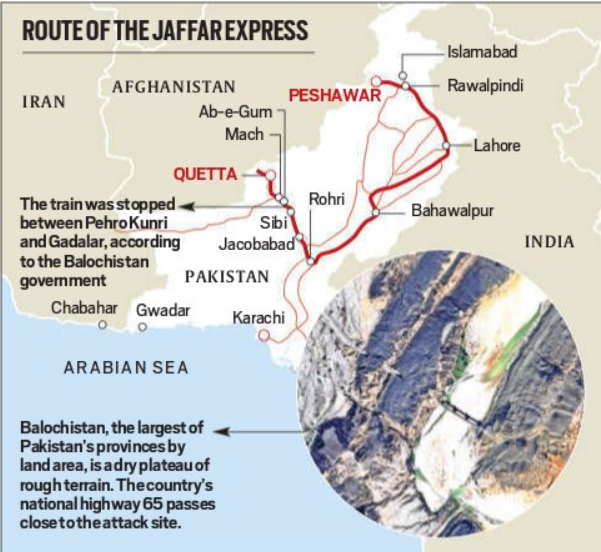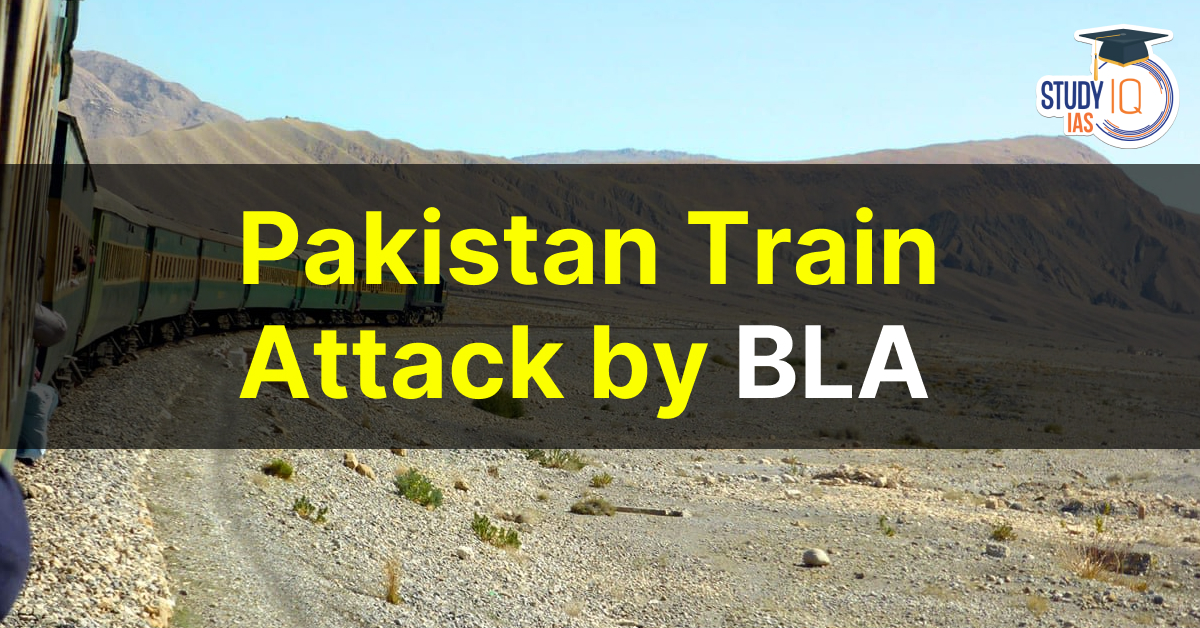Table of Contents
The recent Pakistan train hijack by the Baloch Liberation Army (BLA) has drawn global attention. The hijacking of the Jaffar Express in Balochistan, Pakistan, on March 11, 2025, resulted in significant casualties, hostage situations, and escalated tensions in the region. This detailed report covers the incident, the motives behind the attack, and its broader implications.
Pakistan Train Hijack by Balochistan Liberation Army (BLA)
The Jaffar Express, traveling from Quetta to Peshawar, was targeted by armed militants belonging to the Baloch Liberation Army (BLA). The train was attacked at Tunnel Number 8, a crucial passage in Balochistan’s railway network. Key details include:
- Militants blew up the railway track, causing the train to derail.
- Attackers opened fire, injuring several passengers and the train driver.
- Over 180 people, including civilians and Pakistani soldiers, were taken hostage.
- The militants reportedly separated passengers based on ethnicity, targeting Punjabis and military personnel.

Casualties and Rescue Operation
The hijacking resulted in numerous casualties:
- 20 Pakistani soldiers were killed in the attack.
- 30 militants were neutralized in subsequent military operations.
- Over 190 hostages were successfully rescued, while a few remain in captivity.
- Hostages were reportedly taken into the mountainous terrain, making rescue operations complex.
Who is the Baloch Liberation Army (BLA)?
- BLA is a Baloch nationalist militant group that has been active in Pakistan’s Balochistan province since the early 2000s.
- It is one of the most prominent separatist groups fighting for Baloch independence.
- It is designated as a terrorist organization by Pakistan, the UK and the USA.
- BLA wants to establish an independent Balochistan, separate from Pakistan.
- Baloch insurgents oppose the China-Pakistan Economic Corridor (CPEC), claiming it exploits local resources without benefiting the Baloch people.
Balochistan: Pakistan’s Largest but Least Developed Province
- Balochistan is Pakistan’s largest province by area but has low population density.
- It is rich in natural resources: Oil, gas, gold, and copper.
- Economic inequality: Despite its resource wealth, Balochistan remains economically backward compared to Punjab, Sindh, and Khyber Pakhtunkhwa.
- Punjabis dominate the military, bureaucracy, and industries, leading to ethnic resentment among Baloch people.
Historical Background of Baloch Separatism
- Balochistan remained independent from Pakistan until March 1948.
- The Khan of Kalat, a key regional leader, controlled Kalat, Makran, Las Bela, and Kharan.
- He initially sought independence for Balochistan but faced political pressure to join Pakistan.
- British geopolitical concerns (fear of Russian influence) and internal demands from Kharan, Las Bela, and Makran contributed to Balochistan’s accession.
- Baloch separatist movements have persisted ever since.
BLA’s Demands and Objectives
The Baloch Liberation Army (BLA), a separatist militant group, claimed responsibility for the attack. Their key demands include:
- Release of jailed Baloch fighters.
- Greater control over Balochistan’s natural resources.
- Acknowledgment of Balochistan’s independence from Pakistan.
The BLA accuses the Pakistani government of exploiting Balochistan’s rich resources, such as natural gas and minerals, without sharing benefits with the local population.
Military and Government Response
Pakistan’s military launched a major counter-offensive:
- Security forces used helicopters and sniper units to neutralize BLA militants.
- The rescue operation was delayed due to the presence of suicide bombers among the attackers.
- The Pakistani government has condemned the incident, labeling it an act of terrorism.
International Reactions
The attack has sparked strong global reactions:
- UN Secretary-General Antonio Guterres condemned the hijack and called for the release of the remaining hostages.
- China, a major investor in Pakistan’s infrastructure projects, expressed concern over the growing insurgency in Balochistan.
- The incident may impact China’s Belt and Road Initiative (BRI), which heavily relies on Balochistan’s strategic Gwadar Port.
Why is Balochistan Important?
Balochistan holds strategic importance for Pakistan due to:
- Vast natural resources like gas, coal, and minerals.
- The Gwadar Port is a critical point in global trade under China’s BRI.
- The region’s location, bordering Iran and Afghanistan, makes it geopolitically sensitive.
The BLA has targeted such infrastructure to highlight what they claim is the exploitation of Balochistan’s resources without local benefit.
Security Concerns and Future Implications
The hijack has raised security alarms in Pakistan:
- Increased attacks could threaten future investments in Pakistan’s economic projects.
- The attack adds to growing concerns about internal instability and rising militant activities.
- The Pakistani government faces mounting pressure to strengthen railway security in conflict-prone areas like Balochistan.
Historical Context of the Baloch Insurgency
The Baloch insurgency dates back to 1948 when the princely state of Kalat (now part of Balochistan) was annexed by Pakistan.
- Major insurgencies occurred in 1958–59, 1973–77, and 2004–present.
- The latest wave of insurgency began in the early 2000s, coinciding with the rise of nationalist sentiment and opposition to the CPEC.
- The BLA remains the most prominent militant group in the region, alongside other factions such as the Baloch Republican Army (BRA) and the United Baloch Army (UBA).
Conclusion
The Pakistan train hijack by the Baloch Liberation Army marks a severe escalation in the ongoing Baloch insurgency. With lives lost, hostages taken, and demands escalating, the situation underscores the deep-rooted tensions between the Baloch people and the Pakistani state. As security forces continue their rescue efforts, the incident has drawn international attention, posing challenges to regional stability and economic development.


 India-Bangladesh Relation, Areas of Coop...
India-Bangladesh Relation, Areas of Coop...
 India China Relations, Evolution, Areas ...
India China Relations, Evolution, Areas ...
 Africa’s Nuclear Energy Market Status ...
Africa’s Nuclear Energy Market Status ...





















